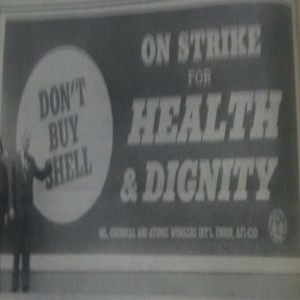
On this day in labor history, the year was 1973.
That was the day Oil, Chemical and Atomic Workers struck Shell Oil over health and safety issues.
OCAW had been involved in lobbying for the passage of OSHA and other environmentally related Acts.
Their members worked in some of the most dangerous, most toxic industries in the country.
By 1972, they demanded contract language for health and safety committees on the job.
The oil companies countered with accusations that improved safety proved too expensive and that OCAW used the issue to assert union control over the production process.
The other oil companies eventually settled in OCAW’s favor.
But Shell would not budge.
And so, the OCAW called a strike at eight facilities and a boycott of all Shell products.
They also successfully enlisted the support of environmental organizations by stressing toxic chemical exposure and hazards faced by workers and the public alike.
Picket lines were solid and thousands honored the boycott.
Sales for Shell fell by 25%.
After four months, the strike fund was nearly drained.
Shell exploited internal divisions among members at a Texas plant and negotiated a separate settlement.
What health and safety language Shell agreed to, was non-binding.
The union was broke and the strike ended in compromise in early June.
Despite this, as historian Robert Gordon notes, OCAW was able to “gain strong health and safety language at all other oil companies for the first time, heightened public awareness of health hazards confronting millions of workers…and pressured OSHA into adopting stricter standards. Perhaps more importantly, the strike solidified the tentative labor-environmental alliance.”
Having merged with the United Steelworkers, the union continues to secure safe working conditions through contracts and alliances today.
More Episodes
 2023-12-30
2023-12-30
 2023-12-28
2023-12-28
 2023-12-28
2023-12-28
 2023-12-26
2023-12-26
 2023-12-23
2023-12-23
 2023-12-21
2023-12-21
 2023-12-20
2023-12-20
 2023-12-19
2023-12-19
 2023-12-19
2023-12-19
 2023-12-16
2023-12-16
 2023-12-16
2023-12-16
 2023-12-12
2023-12-12
 2023-12-12
2023-12-12
 2023-12-10
2023-12-10
 2023-12-09
2023-12-09
Create your
podcast in
minutes
- Full-featured podcast site
- Unlimited storage and bandwidth
- Comprehensive podcast stats
- Distribute to Apple Podcasts, Spotify, and more
- Make money with your podcast
It is Free
- Privacy Policy
- Cookie Policy
- Terms of Use
- Consent Preferences
- Copyright © 2015-2024 Podbean.com




